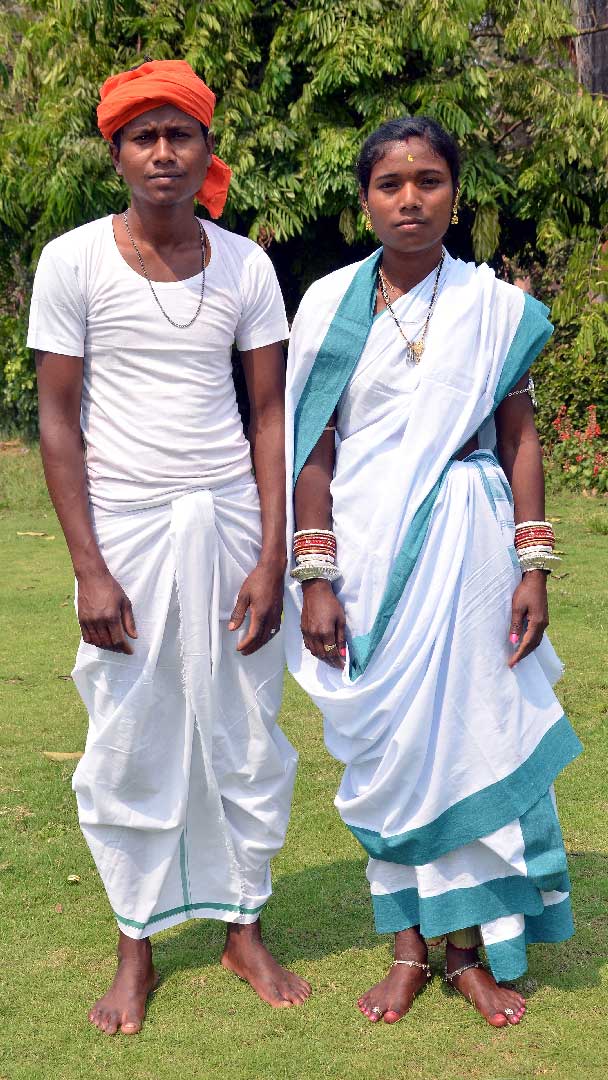TRIBES OF ODISHA
TRIBES OF ODISHA
Kolha
Region: Mayurbhanj, Keonjhar and Balasore
Population*: 6,25,009
Language: Kol
Map: Click Here
Origin: Also identified as Kol, Kol-Loharas and Ho, the Kolha belong to the same ancestral stock as the Munda and Mundari. The community still retain marriage ties well into Jharkhand, from where they have migrated outward.
Culture and Crafts: Their artistic expression takes the form of paintings of animals and plants on the walls of the home. They are also fond of music and dance which accompanies all festive occasions. Among the Kolha it is only the women who dance, while the men play the drums and sing.
Occupation: Engaged primarily in the cultivation of paddy.
*Scheduled Tribes Population as per Census 2011 data. PVTGs Population as per Micro Project Survey Data, 2010
Kolha
Region: Mayurbhanj, Keonjhar and Balasore
Population*: 6,25,009
Language: Kol
Map: Click Here
Origin: Also identified as Kol, Kol-Loharas and Ho, the Kolha belong to the same ancestral stock as the Munda and Mundari. The community still retain marriage ties well into Jharkhand, from where they have migrated outward.
Culture and Crafts: Their artistic expression takes the form of paintings of animals and plants on the walls of the home. They are also fond of music and dance which accompanies all festive occasions. Among the Kolha it is only the women who dance, while the men play the drums and sing.
Occupation: Engaged primarily in the cultivation of paddy.
*Scheduled Tribes Population as per Census 2011 data. PVTGs Population as per Micro Project Survey Data, 2010
Kolha
Region: Mayurbhanj, Keonjhar and Balasore
Population*: 6,25,009
Language: Kol
Map: Click Here
Origin: Also identified as Kol, Kol-Loharas and Ho, the Kolha belong to the same ancestral stock as the Munda and Mundari. The community still retain marriage ties well into Jharkhand, from where they have migrated outward.
Culture and Crafts: Their artistic expression takes the form of paintings of animals and plants on the walls of the home. They are also fond of music and dance which accompanies all festive occasions. Among the Kolha it is only the women who dance, while the men play the drums and sing.
Occupation: Engaged primarily in the cultivation of paddy.
*Scheduled Tribes Population as per Census 2011 data. PVTGs Population as per Micro Project Survey Data, 2010
Kolha
Region: Mayurbhanj, Keonjhar and Balasore
Population*: 6,25,009
Language: Kol
Map: Click Here
Origin: Also identified as Kol, Kol-Loharas and Ho, the Kolha belong to the same ancestral stock as the Munda and Mundari. The community still retain marriage ties well into Jharkhand, from where they have migrated outward.
Culture and Crafts: Their artistic expression takes the form of paintings of animals and plants on the walls of the home. They are also fond of music and dance which accompanies all festive occasions. Among the Kolha it is only the women who dance, while the men play the drums and sing.
Occupation: Engaged primarily in the cultivation of paddy.
*Scheduled Tribes Population as per Census 2011 data. PVTGs Population as per Micro Project Survey Data, 2010
PVTG Communities
62 Scheduled Tribes
PVTG Communities
62 Scheduled Tribes
PVTG Communities
62 Scheduled Tribes





